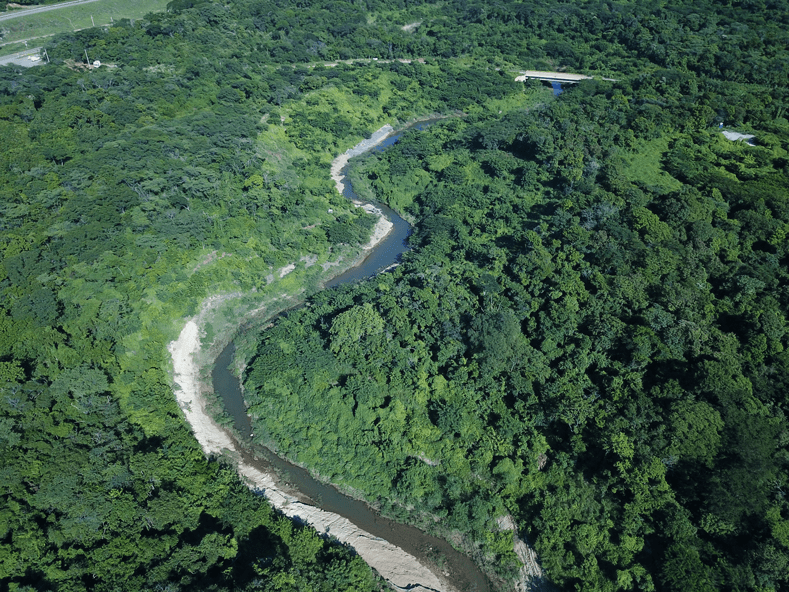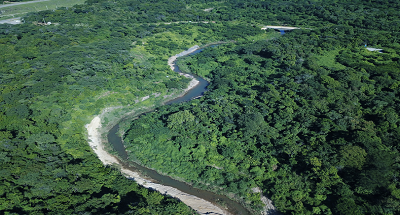E-Newsletter may 2019

Inter-institutional Work Group to Resolve Doubts on La Puente Project
In April 2, 2019, Cerrejón was notified of the Constitutional Court’s decision on the tutela presented by indigenous communities regarding alleged effects produced by partial modification of the Bruno Creek riverbed. This decision orders the Inter-institutional Work Group created in 2016, made up of 17 national and regional entities, to continue working on a technical study to provide answers to the doubts expressed by the Court, which is fundamental to decide on continuation of the La Puente project.
Modification of the Bruno Creek riverbed has formed part of the Environmental Management Plan since 2005, and its detailed engineering was approved by the National Authority of Environmental Licenses (ANLA) in 2014. The work, which began in 2016, consisted in modifying 3.6 kilometers of the Bruno Creek riverbed, shifting it 700 meters north of its original location.
This work was discussed with different interest groups within the framework of a constructive and respectful dialogue, leaving space for reflection among the communities. Additionally, two prior consultation processes on this project have taken place. The first was with the indigenous community in Campo Herrera, which finished with a series of agreements related to economic strengthening, cultural and environmental projects that were defined with the community, ultimately fulfilling all the commitments coming from this consultation. The second, currently in progress, relates to the La Horqueta community, where some preliminary agreements have already been reached that make us confident the situation will end satisfactorily for all parties. Finally, in fulfilment of the decision from the Court in La Guajira, we are awaiting agreement on a methodological roadmap to advance with two other consultations with the communities of El Rocío and Tigrepozo. These two communities are, according to official entities, the ones that meet the same conditions as La Horqueta (intercomunis effect) in regard to their relationship with Bruno Creek.
It is important to point out once more that the work on Bruno Creek was developed following recognized social, environmental and engineering standards, and was supported by rigorous technical studies issued by national and international experts. Thanks to this, the new riverbed shows behavior consistent with its design, reflecting the same biological conditions of the original riverbed, which guarantees the preservation of this body of water’s flora and fauna. The project has been the object of exhaustive evaluations done by the Inter-institutional Work Group, who confirmed that the work did not affect the water supply to neighbouring communities.
Cerrejón is respectful of the rights of the communities and of the environment and trusts that the results from the Work Group will provide answers to the points raised. Likewise, Cerrejón respects this decision and will provide full support to fulfil what the Court has ordered. Additionally, the company will continue fulfilling all the requirements of the Constitutional Court, which as of 2017 ordered suspension of operations in the La Puente pit in the area of the work on the riverbed until the Inter-institutional Work Group reached a decision under the terms ordered in the decision.
Cerrejón’s ongoing Commitment to Respect for Social Leaders
From the moment we put our Human Rights Policy into action in 2005, we have understood the need to reinforce due diligence on this matter, which must necessarily adapt to the context and realities of the area in which we operate. For this reason, one of our work issues over the past two years has focused on strengthening our actions in the face of threats received by social leaders in our region. Since then, we have responded to 28 cases related to threats to social leaders and human rights defenders, requesting that the authorities investigate the cases that have come to our attention and provide all necessary protective measures.
As members of the Working Group on Human Rights and Coal (Grupo de Trabajo de Derechos Humanos y Carbón), created in 2018 by companies from the mining sector in Cesar and La Guajira and with participation from the national government, we helped develop a Roadmap for Protection from Threats Against Life and Integrity. The goal of this roadmap is to guide our actions as a company in relation to these types of events, showing special coordination and coherence with the laws and protocols established by the Colombian state on these cases. Our intention this year is to share and validate this protocol with local institutions and civil society in the department of La Guajira, as well as to incorporate the adjustments that will contribute to improving the actions of all those involved.
As a result of analyzing the context and obligations in the framework of our Human Rights Policy, we find ourselves working on improving understanding of the context in La Guajira that led to an increase in the number of cases of threats, comprehending better the role and capabilities of the local authorities and promoting their strengthening in this subject, and reinforcing the internal investigative mechanisms within the company when some indication or connection with these incidents exist.
Cerrejón is convinced that in order to move towards a more peaceful society, the role of social leaders and human rights defenders is essential to strengthen democracy in the country and improve co-existence in the territory. We maintain our commitment to promoting respect for the work of these leaders and defenders, and we will continue to act responsibly and with transparency
Respect for human rights is an obligation for direct staff as well as for contractors, and as such represents a cornerstone of our operations. We invite you to learn more about our Human Rights Policy.
Productive Projects at Resettlements: In Search of new opportunities

At Cerrejón, we see the process of resettlement as a measure of last resort, one that is done to avoid environmental impacts on the communities caused by the development of mining operations. The transfer of people and families from their place of origin is a process that involves emotional, social and cultural challenges, and as such resettlement must be carried out under rigorous standards, being guided by participative processes that involve the community in plans directed towards new and better opportunities.
Under guidelines from the International Finance Corporation (IFC) for social and environmental performance standards, for more than ten years we have carried out resettlements with 179 families from the Roche, Patilla, Las Casitas, Chancleta and Tamaquito II communities. This decade has presented challenges, but it has also provided valuable learning opportunities for Cerrejón and the communities, with whom we maintain an on-going relationship, working on building agreements aimed at their well-being.
As part of the compensation payments required due to the impacts created by resettlement, Cerrejón and the families agreed on the establishment of productive projects, which are added to the economic activities that were developed in the place of origin and have been restored or compensated for in the agreement. Thus, productive projects form a strategy that allows long-term income to be produced and which complements the income received by each family group prior to the resettlement process or to provide for their basic needs.
To get the projects started, Cerrejón has provided seed capital to the families as well as the necessary technical support to make carrying out their endeavours easier. Along with the communities and entities such as the Codesarrollo Foundation, the National Training Service (SENA) and the La Guajira Chamber of Commerce, we have developed research that allows them to identify their interests, expectations and productive profile. This has been done with the aim of designing training and business plans that translate into strengthening of their capabilities and sustainable income for the families.
We have worked with 166 resettled families in the development of 190 productive projects, and we will continue working alongside the 13 remaining families who still have not decided in which project to invest their capital.
For proper development of agricultural projects, we have worked alongside the families to find solutions for the diverse difficulties involved in these types of activities, such as, for example, the water supply, where together we have been able to implement solutions that have facilitated the realization and advancement of various of the proposals for food production and to raise animals.
We are aware that not all people are attracted by the idea of developing an enterprise. Nevertheless, we have concentrated our efforts on guiding and accompanying the communities who identify with this type of activity by means of interventions, training, consulting and business plans that let them design the scope of their initiatives, identify possible markets and implement sales strategies.
Productive projects are only one part of Cerrejón’s work to contribute to the sustainability of resettled families. As a company, we consider strengthening the capabilities of resettled people, especially young people, essential to creating the positive transformations the territory needs and contributing to improvement of the families’ living conditions. In this sense, the compensation package also includes an educational strengthening program to increase and fortify knowledge and an educational training program with which we support access to technical, technological, higher and advanced education for the communities. To date, 267 members of the resettled communities have benefited from this program and 100 have graduated.
With an eye towards diversification, Cerrejón, along with the communities, makes an effort to provide employment alternatives, improving the skills of candidates for the various selection processes, by which we have increased the number of people from these families connected with the Sena apprentice programs.

Paladines Creek: A water governance model

As part of our commitment to strengthening capacity-building in communities and promoting knowledge about the preservation of ecosystemic services in La Guajira, Cerrejón and the Cerrejón Foundation presented the book Paladines, a Look at Conservation and Protection of the Micro-basin, which narrates the resulting experiences from work done over a ten-year period to protect the micro-basin of Paladines Creek, a tributary of the Ranchería River located between the communities of Hatonuevo and Barrancas.
At Cerrejón, we are aware of the importance of water as a vital resource for the communities and also of the challenges faced in La Guajira due to the water deficit in the region. This is why, in addition to promoting optimal usage of water in the operation, we also concern ourselves with the care and conservation of water in the region through implementation of supply and water treatment solutions and integrated management of the river basins. In regard to this last point, actions have been developed aimed at conservation and restoration of water sources from the Bruno, Pupurema, El Pasito, Majagüita and Paladines creeks.
More than 600 people from campesino, indigenous and Afro-descendent communities as well as public and private entities participated in the experience to protect the Paladines Creek river basin. This journey allowed us to learn and identify lessons about integrated management of river basins, a process enveloping four components: water governance, ecosystemic connectivity, integrated water management and sustainable production systems.
The successful development of this program is due mainly to the invaluable participation of the communities that live near the micro-basin, who are committed to implementing sustainable practices that translate into social, economic and environmental benefits for their families and the region. The creation of the Asociación de Vigías Ambientales, an environmental watchdog group, plus implementation of silvopastoral systems and development of more than 2,000 hectares under community conservation agreements are some of the results of this initiative. Additionally, it is important to emphasize the contribution of unskilled labour from the communities, an example of participative management in the conservation of water resources that can be evaluated and repeated in other settings in La Guajira and Colombia.
HIGHLIGHT. Gonzalo Ortiz Pushaina, Traditional Authority from the El Zahíno Indigenous Reservervation, stated: “Over the years, many people have passed through this process, those who arrived and those who have gone, and as they did they left an indelible and enriching mark on us. Initially, we thought it was only about asking for materials to make adaptations in our homes, but later we began to understand that everything forms part of a process that connects to the land, the animals, the sources of water, the crops and in general to mother earth. In this process we learned, thanks to the Cerrejón Foundation and all the entities that participated, the way to know our environment, using it correctly and taking advantage of the services offered to us for our livelihood”.
ISO 14001, OHSAS 18001 and AEO Certifications
Cerrejón has received recertification in both environmental management standard ISO 14001 (2018 version) and occupational health and safety standard OHSAS 18001 for a period of three years. The company has been certified in both standards continuously since 2003. These accreditations endorse the company’s good performance in the areas of industrial health and safety, and our commitment to an operation that is environmentally responsible. SGS, a worldwide leader in inspection and verification, accredited Cerrejón’s management on these fronts.
Additionally, we received certification as an Authorized Economic Operator (AEO), given by the Colombian customs agency to companies committed to safety throughout their supply chain who meet customs safety requirements and obligations. This certificate makes customs procedures with other actors who have implemented high safety standards in their logistical operations easier, which is essential when it comes to exporting coal.

In April 2, 2019, Cerrejón was notified of the Constitutional Court’s decision on the tutela presented by indigenous communities regarding alleged effects produced by partial modification of the Bruno Creek riverbed.
E-Newsletter may 2019
